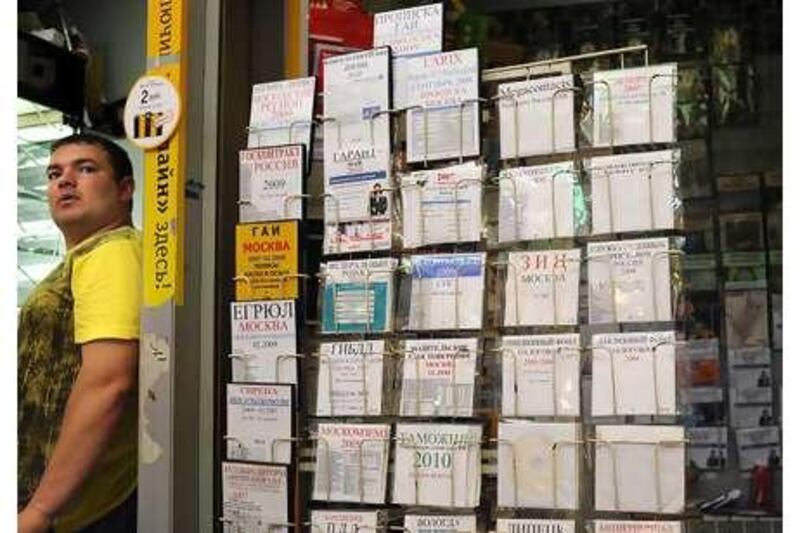MOSCOW // For centuries Russia's rulers have meticulously kept the details of state affairs concealed from outsiders. But at the Savyolovsky electronics market in northern Moscow, state secrets are freely sold for about US$50 (Dh185) a pop. Here, amid kiosks peddling mobile phones, digital cameras and pirated versions of the latest Hollywood blockbusters, peppy salesmen rattle off a list of confidential databases leaked from government offices and conveniently packaged on CDs for public consumption.
Tax records, police wanted lists, even confidential records from the secretive Federal Security Service, the main successor agency to the notorious KGB: it is a treasure trove of sensitive information available to the curious and nefarious alike. "Most of our clients are well off," a twentysomething salesman at one of the shops selling these illegal databases said on a recent weekday afternoon. He froze momentarily when told he was speaking to a reporter but, after being assured he was not being set up, agreed to talk while taking a smoke break outside amid the smells of processed meat wafting around from nearby hot dog and shawarma stands.
The shops are overseen by a krysha, or "roof", the salesman said on condition of anonymity, using the slang term for a protection racket commonly run by law enforcement officers. He said he did not know exactly who the suppliers were but nodded when asked if state servants were the source of the illicit information. Demand for the data contained on these illegal discs, which are sold in blank white covers marked with handwritten annotations to denote their contents, remains brisk. The information can be used to track down people who do not want to be found, help a hitman locate a target, or simply discover what cars or property an individual owns.
Kirill Kabanov, an anticorruption activist and a member of the Kremlin's council on human rights and civil society. "It is the result of the total corruption of the government system." The databases, however, are rarely leaked with the average Russian in mind, experts say. Typically, deep-pocketed clients get first crack at the information for a premium, said Nikolai Fedotov, a senior analyst with InfoWatch, a subsidiary of Kaspersky Lab that specialises in data security. Kaspersky is an antivirus software developer.
"Such fresh data is expensive," Mr Fedotov said. "After a few months, the same database is sold to a wider group of clients for less money. After that, it's sold to anyone at bargain prices." The average price of a single disc at the Savyolovsky market is 1,500 roubles (Dh175). In 2007, the Russian government enacted legislation ostensibly aimed at protecting citizens' privacy. But the law, scheduled to come into full effect next year, will do little to halt the leaks because it does not extend to numerous government agencies from which the information is released, Mr Fedotov said.
In fact, Russian law does not specify any punishment for those buying or selling the illegal databases, Mr Fedotov said. The krysha is necessary for the dealers largely because they operate in areas rife with pirated DVDs and because in Russia "it's almost impossible to sell any ware, even a legal one, without a krysha", he said. Infowatch estimates the annual turnover in the trafficking of these discs at 100 million to 120 million roubles, a sum Mr Fedotov calls "very small". He downplayed the value of this data, saying: "It's impossible to steal money with it."
Some enterprising individuals, however, have discovered ways to use the databases to illegally pad their bottom line, Russian authorities say. Moscow police on June 8 announced they had detained 40 suspects in a scheme using illegal databases to swindle several thousand pensioners and Second World War veterans nationwide out of more than $1 million. The suspects used databases from Russian social services agencies to call the victims and, posing as state social workers, sell them overpriced medicines advertised as miracle elixirs, Filipp Zolotnitsky, a police spokesman, told the state-run Interfax news agency.
After the pensioners began reporting the scam to police, the suspects changed tactics. Now posing as investigators, the suspects called the targets and informed them that the scam artists had been arrested and that they were entitled to a monetary reward for their vigilance, Mr Zolotnitsky told Interfax. But to receive the money, they told the victims, the pensioners would have to transfer a sum totalling 18 per cent of the money they had lost to a given bank account, police said.
Similarly, suspects used a database of Second World War veterans to inform them they were entitled to a large monetary reward for their pain and suffering, but that an 18 per cent tax on the reward had to be transferred in advance to a bank account to receive the money, Mr Zolotnitsky told Interfax. Repeated attempts to reach Mr Zolotnisky for comment were unsuccessful. But he was quoted by Interfax as saying the suspects defrauded the veterans out of more than 35m roubles in a month's time.
In a report last week on the state-owned Rossia television, undercover journalists used a hidden camera to record a conversation with the same pirate database salesman interviewed by The National at the Savyolovsky electronics market a week earlier. Sitting behind his desk, sunglasses obscuring his eyes, the young man told the journalists the shop had a steady stream of fresh databases from Russian traffic police, among other wares.
"A lot of people buy the mobile phone [database]," he said. "We'll sell it to you for 1,000 roubles." cschrek@thenational.ae






